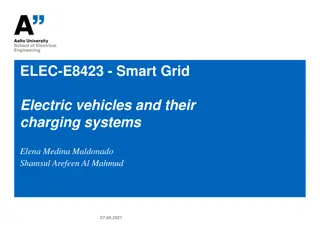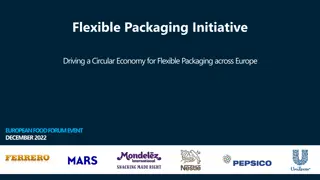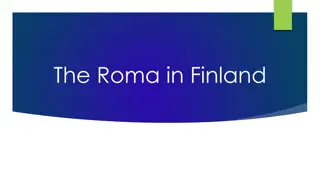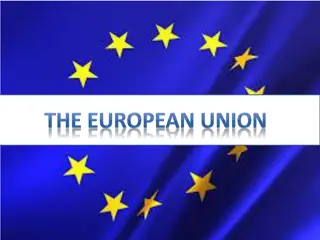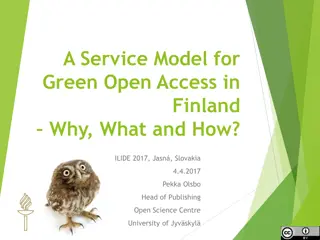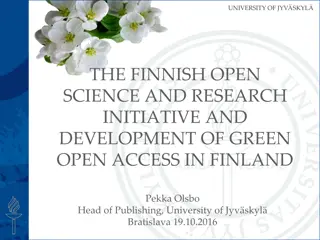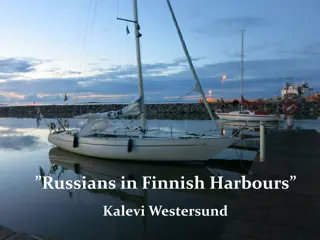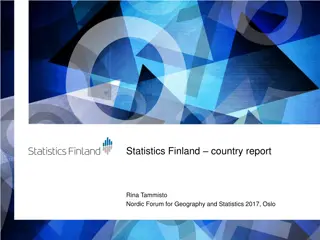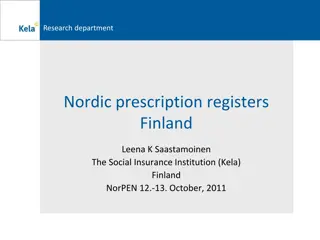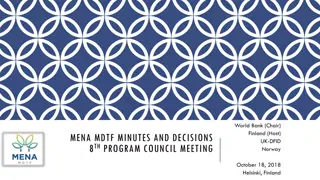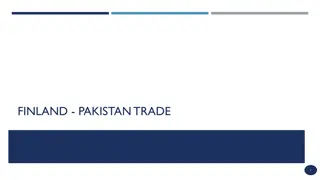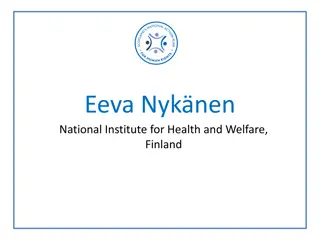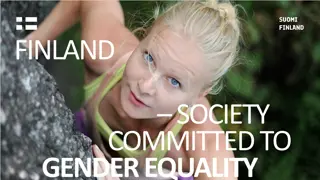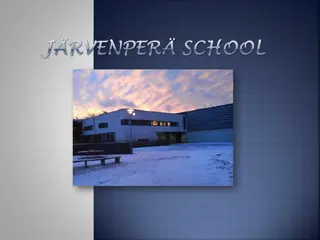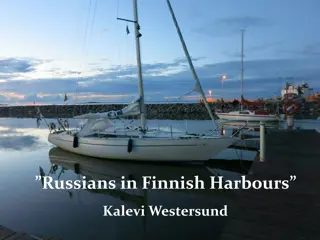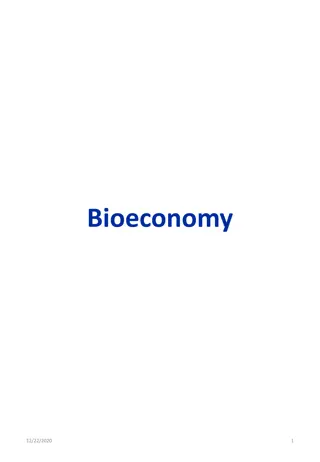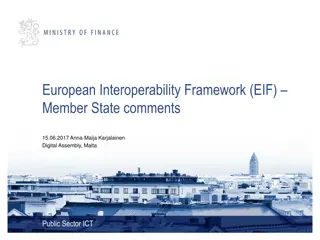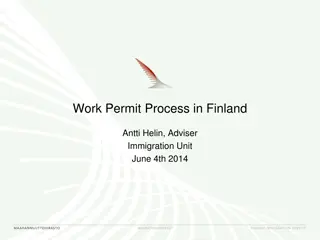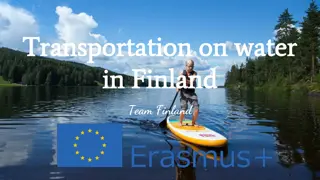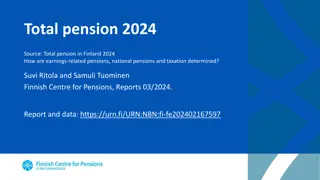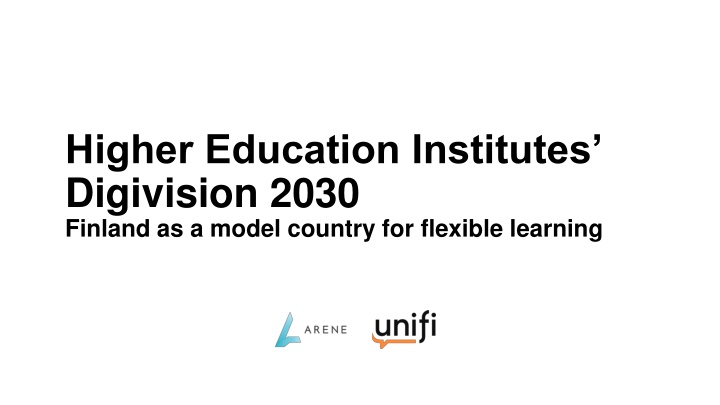
Finland's Flexible Learning Model for 2030
Finland envisions a pioneering education system in 2030, focusing on learner empowerment, open communities, and data utilization for individual and societal benefits. The Digivision 2030 project aims to create a national digital service platform, enhancing compatibility, learner data management, and support for change in higher education institutions.
Download Presentation

Please find below an Image/Link to download the presentation.
The content on the website is provided AS IS for your information and personal use only. It may not be sold, licensed, or shared on other websites without obtaining consent from the author. If you encounter any issues during the download, it is possible that the publisher has removed the file from their server.
You are allowed to download the files provided on this website for personal or commercial use, subject to the condition that they are used lawfully. All files are the property of their respective owners.
The content on the website is provided AS IS for your information and personal use only. It may not be sold, licensed, or shared on other websites without obtaining consent from the author.
E N D
Presentation Transcript
Higher Education Institutes Digivision 2030 Finland as a model country for flexible learning
Digivision 2030 National learning data reserves for use by individuals and society Digivision s four promises 1. MyData for learners 2. Learner s benefit at the centre of development 3. Higher education institutes are open communities led with information 4. Data for use by individuals and society Finland is a model country for flexible learning in 2030. Learners are provided with data on their own learning in a secure manner. This enables and supports their learning throughout their lives. With the vision, Finnish education will become a global pioneer Operational target state for 2030 In 2030, Finland has an open and recognised learning ecosystem that offers quality, diversity, flexibility, efficiency and suitability for the life situation and needs, thus generating better learning results. Each learner has one national identity, and all education has a joint authentication service The learner can utilise higher education institutes' open e-learning offering as needed. The learning ecosystem also provides a platform for research and innovation activities, benefiting society and working life extensively. The national my data portal provides the learner with access to all information for life. The information provides a basis for advising, guidance, identification of competence and, if desired, job-seeking. In 2030, the scientific and educational activities of higher education institutions secure high level of competence of the adult population, national competitiveness and international impact. Shared data pools are in use. Data models have been agreed on, and information can be utilised by a private, public and foreign actor.
Digivisions target state and impact Internationality The objective of the Digivision 2030 project is to create, as mutual and stakeholder cooperation, by 2030 a 1. National digital service platform that a) enables the compatibility of digital services between higher education institutions, b) provides the learner's my data service and integrates the accumulation of the learner s competence before and after the higher education institution to the learning and career path and c) improves the compatibility of the actors' IT services and lowers the threshold for utilising national solutions. LEARNER S My Data, DATA POOLS MANAGEMENT MANAGEMENT CHANGE CHANGE Continous learning eStudy services LEARNER S PATH, DIGITAL STEERING AND SUPPORT 2. Guidance based on digital pedagogics, the learner s path and shared data, which a) supports studies and student well-being regardless of time and place and in an accessible manner, b) Brings AI solutions as an aid in guidance, and c) places the learner's benefit at the centre of development. DIGITAL PEDAGOGICAL COMPETENCE ACCESSIBLE DIGITAL STUDY OFFERING 3. Support for change management for higher education institutions, so that we can a) introduce the national digital service platform b) digitize student administration processes and admission to higher education institutions, c) support the development of higher education institutions into open communities managed by information, and d) make data available for individuals and society. Key projects Ecosystems of learning and working life Upper secondary education CHANGE MANAGEMENT Digivision s components The learner's MyData and the learner's path, digital-pedagogical competence and accessible study offering that develops learning and the learner's well-being. The components create a platform where results of the key projects are made available for national use. Bringing components to the operation of higher education institutions requires support and change management.
Towards a shared national vision: Digivision 2030 until now In 2020 Steering Shared commitment Roots Shared vision Joint overall plan and roadmap General assembly of all higher education institutions Implementation program for the Ministry of Education and Culture s education and research vision in 2030 Unifi and Arene propose a shared vision for the digitalisation of higher education All Finnish higher education institutions are committed to a shared vision and have signed a letter of intent Recruitment of the program director Steering group Establishment of a program office Coordinating bodies: Aalto and Metropolia Preparation of the funding application Steering model and consortium agreement
Digivisions promises MyData for learners Learner s benefit at the centre of development Universities are open communities led with information Data for use by individuals and society
Promise 1: MyData for learners Learners have access to their own learning data and profile as well as the latest information on the trends in the labour market. These enable them to plan and complement their competence at all stages of their lives. Learners receive advisory, guidance and support services according to their needs. The aim is to support the individual's capabilities and opportunities for lifelong learning.
Promise 2: Learners benefit at the centre of development Universities and educational institutions move from administrative and system-based thinking to meeting different learning needs from the perspective of individuals, business life, society, national and international influence. Organisations in the learning ecosystem have access to digital services enabling them to have the demand for and supply of education to meet in a user-friendly and efficient manner. The services can be international, national as well as specific for the organisations. The ecosystem enables closer cooperation and profiling between higher education institutions. At the same time, it frees up resources for developing working environments that support learning and research.
Promise 3: Universities are open communities led with information The planning of education offering, study processes and student guidance are based on continuous analysis of competence needs, identification of effective operating methods and rapid application of the information obtained. The objectives and operating models of higher education institutions encourage teachers and students to network-based cooperation, continuous employment-oriented and research- based pedagogical development and the production of communal learning material. The 2030 higher education institution is an open, flexible and networked community led by information.
Promise 4: Data for use by individuals and society National learning data reserves are opened for use by individuals and society. This brings international competitiveness for the whole of Finland. Nationally shared and refined information about learners, competences, learning and study contents becomes a unique success factor. Information accumulated from learning and the labour market is used to allocate education and to develop administration, for example, in order to optimise the effectiveness of employment and national research and development activities. Learning environments safely expand into international environments where Finnish learners receive the latest information. Finnish organisations offer their best competence on a global scale.
Digivision 2030: National learning data reserves for use by individuals and society Perspective of organisations that utilise competence: demand, skills, employment relationships, resources, partnerships, processes... Perspective of organisations that provide teaching: supply, resources, teachers, processes, partnerships, service, administration... International perspective: fields of science, industries, innovation ecosystems, edupreneurs... Learner s perspective: personal profile (myData), skills, demonstrations, interests, plans... Shared information as a success factor
Timetable Preparations for Digivision Higher education institutions signed a letter of intent on Digivision on 11 February 2020 Establishment of steering group 2019 Digivision s start-up stage Agreement on a project office and establishment of the project office Recruitment of the program director Preparation of the funding application and submission of the application Transfer of responsibility for the project to the program office and program director Technical, pedagogical and financial planning of the project and a preliminary roadmap 2020 Implementation of Digivision 2021 2030
Digivisions steering group Ilkka Niemel , President, Aalto University Ari Hirvonen, Digital Director, University of Jyv skyl Hannu Ikonen, Head of Education Development, JAMK University of Applied Sciences Annukka Jokipii, Vice President, University of Vaasa Kati Kettunen, Head of Services, University of Helsinki Marjo Nenonen, Development Manager of Education, Karelia University of Applied Sciences Manu Pajuluoma, Chief Information Officer, University of Lapland and Lapland University of Applied Sciences Jari Perki m ki, Rector, University of the Arts Helsinki Matti Sar n, President/CEO, Kajaani University of Applied Sciences Eeva Viitanen, Director, Development, Metropolia University of Applied Sciences
DIGIVISIO2030.fi Contact us Hanna Nordlund, Program Director hanna.nordlund@csc.fi +358 50 354 0052

